The European Union of Medical Specialists (UEMS) was set up on 20 July 1958, 16 months after the Treaty of Rome was signed. In 1962, the UEMS Section of Psychiatry was established. It was, however, relatively inactive until it was revitalised following a meeting of the European Societies in 1990 called by the Royal College of Psychiatrists and chaired by Dr (now Dame) Fiona Caldicott. The UEMS Board of Psychiatry was established in 1992 as a working group of the Section with a particular focus on training matters. The Section is currently chaired by Dr Anne Lindhardt (Denmark) and the Board is chaired by Professor Manuel Gomez-Beneyto (Spain). Both Section and Board meet twice a year.
Over the years, the Section and Board have focused on standards for training in accordance with contemporary knowledge and current developments in Europe. It has always been and remains crucial to balance the desire for harmonisation with the recognition of cultural and structural differences. The Section and Board see their role as a quality assurance organisation, setting standards by stimulating the process of development in member countries. It is for the national professional bodies to use these standards and recommendations internally to achieve the goals in their own countries. The Board has not seen it as either helpful or necessary to act as a European examining board for the speciality.
Apart from the full European Union members, there are also a large number of associate member countries. The Association of European Psychiatrists (AEP), the European Federation for all Psychiatric Trainees (EFPT), the Permanent Working Group (PWG) and the Mental Health Regional Office of the World Health Organization also attend, with observer status.
The Section and Board have set up a number of working groups to focus on important UEMS Charters (Box 1) and on fields of activity more exclusively relevant to psychiatry (Box 2). The last three activities in Box 2 are still at an early stage.
Box 1. Activities of the UEMS Specialist Sections and Boards
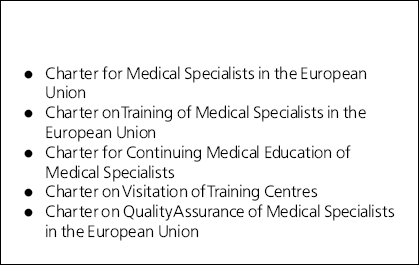
|
Box 2. Activities of the UEMS Section and Board of Psychiatry
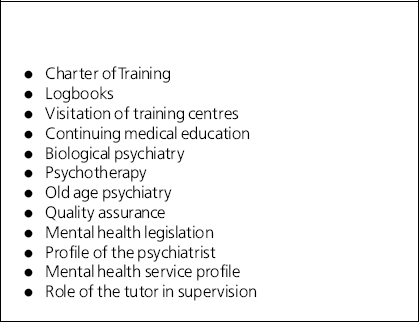
|
Working groups and activities
The Section and Board have focused particularly on Chapter 6 of the UEMS Charter on Training of Medical Specialists in the European Community, which deals with the requirements for the particular speciality (UEMS, 2000a , available on the UEMS website: http:/www.uems.be/psychiat.htm). The minimum duration of training in psychiatry has been set at 5 years, with a stipulated common trunk content that includes in-patient, out-patient, liaison, consultation, emergency psychiatry and psychotherapy. General adult psychiatry, old age psychiatry and psychiatric aspects of substance misuse should form a mandatory part of the common trunk and it is highly recommended also that developmental psychiatry and forensic psychiatry be included. Apart from ongoing clinical supervision, there should be at least 40 hours of weekly individual supervision related to all aspects of working as a psychiatric trainee and additional psychotherapy supervision. Training programmes should be individualised to the needs of the trainee in line with national rules and European Union recommendations. It is stipulated that trainees should have sufficient linguistic ability to communicate with patients, study international literature and communicate with foreign colleagues.
The logbook (Box 3) should be the trainee's personal file to help the trainee obtain maximum benefit from training. As such, it should include a description of activities reflecting compulsory training requirements and providing for verification and monitoring of the training process. It should also provide for identification of specific ‘educational objectives’ to reflect the approved training direction that the trainee is pursuing beyond minimum requirements. Although the number of trainees should not exceed the number of approved training posts, in psychiatry it has not been considered necessary to stipulate a maximum number.
Box 3. The logbook and contents
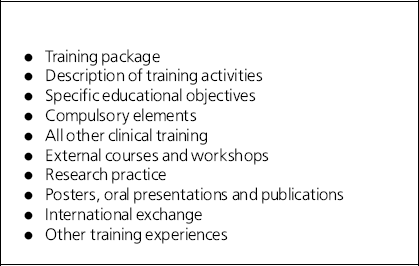
|
With regard to formal recognition of training institutions and teachers, distinction should be made between large institutions where full-time training can take place and smaller specialised institutions that can contribute only to part of the training. The time interval for external visitation by national organisations in order to maintain quality assurance has been set at 5 years. There should be independent consultation of trainees. Training in psychiatry in Europe is described in the 1997 supplement of the European Archives of Psychiatry and Clinical Neuroscience (Reference Hohagen and LindhardtHohagen & Lindhardt, 1997).
Another field in which the Section and Board have been active is the UEMS Charter on Visitation of Training Centres (UEMS, 2000b ), as shown in Box 4. So far, Budapest in Hungary and Kraków in Poland have submitted to such visits. Consideration is being given to the possibility of granting provisional recognition status to centres where good training initiatives fall short of the full requirements.
Box 4. The UEMS Charter on Visitation of Training Centres
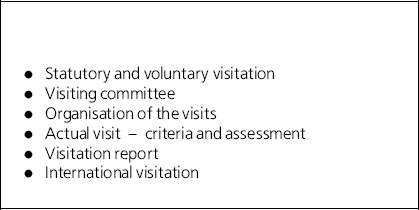
|
A working group has dealt with application of the Charter on Quality Assurance to Psychiatry (UEMS, 2000c ). Following a questionnaire survey of member countries, recommendations have been drawn up identifying targets to be achieved by the year 2000 (Box 5). The working group currently is establishing standards in specialised psychiatric care in the four phases of referral, assessment, treatment/stabilisation and rehabilitation.
Box 5. Recommendations on quality assurance
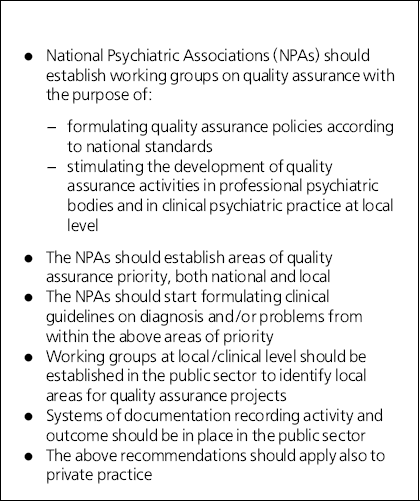
|
A further area of activity has been that of Mental Health Legislation. A questionnaire survey was carried out in 1993 of the 16 member countries with regard to legislation for compulsory admission and other compulsory acts in psychiatry. An internal report highlighted wide variations, both in legislation and in the way it is applied. The working group also focused on identifying harmonising principles for mental health legislation. Recently, this work coincided with that of the Council of Europe's Working Party on Psychiatry and Human Rights, the latter leading to a White Paper/consultation document on the protection of the human rights and dignity of people suffering from mental disorder (Council of Europe Steering Committee on Bioethics, 2000). The UEMS Section, commenting on this ‘White Paper’, stressed that priority should be given to decreasing the risk of involuntary admission and treatment by advising governments to give more emphasis to improved access to adequate and high-quality community-based and out-patient psychiatric services.
The working group on the ‘Profile of the Psychiatrist’ is at an early stage of activity. The problem of defining the role and sphere of activity of the medical specialist is by no means unique to psychiatry and is necessary to determine the legitimate professional activity of the medical specialist. This is not only to protect specialist medical acts from non-medical encroachment but, more importantly, to ensure that patients are treated by the right type of professional with the appropriate skills. This topic is being addressed already in member countries. The Royal College of Psychiatrists has recently published its own recommendations (Royal College of Psychiatrists, 2000). Similarly, in The Netherlands, the Dutch Psychiatric Association has prepared its own ‘Psychiatrist's Profile’ (Dutch Psychiatric Association, 1996). It is likely that these documents will act as a basis for the discussion of this working group.
The working group developing the Mental Health Service Profile aims to harmonise recommendations regarding good models of service and defining irreducible minimum standards of acceptable care. Considerable work has been done already in this field. De Jong has devised a tool, the International Classification of Mental Health Care (ICMHC), for describing services providing mental health care (Reference De Jongde Jong, 1996). Thornicroft and Tansella also have described mental health outcome measures, including the ‘Matrix Model’ (Thornicroft & Tansella, Reference Thornicroft and Tansella1996, Reference Thornicroft and Tansella1998). Thornicroft also has described a National Service Framework for Mental Health (Department of Health 1999; Reference ThornicroftThornicroft, 2000). Finally, the Epsilon Study (Reference Thornicroft, Becker and KnappThornicroft et al, 2000) has explored reliable outcome measures for mental health service research based on a comparative cross-sectional study in five European countries. However, the initial targets of this working group will be less ambitious, focusing mainly on a preliminary qualitative and quantitative database of existing services and provisions.
The most recent working group to be set up will deal with the role of the tutor in supervision. This role is central to the whole process of training and is a major factor determining the outcome of the training process, and yet there are insufficient European guidelines regarding the essential ingredients of this supervisory role. This working group is chaired by Professor Katona. A draft paper was considered at the October 2001 meeting in Prague.
This brief article has summarised the function and activities of the UEMS Section and Board of Psychiatry and its links with related organisations. Given the scope that exists within this organisation to harmonise standards of training and quality service delivery, it might be said that the UEMS has not been sufficiently active in disseminating its charters and other information through national organisations. On the other hand, it is only the national organisations themselves that can decide the extent to which such information is relevant, useful and applicable in their own countries.
Finally, there are several European ‘players’ in the field with potentially overlapping roles and it is important for these to have a complementary role with each other to maximise output. In this regard, a recent joint meeting between the representatives of European psychiatric organisations in five World Psychiatric Association zones and the UEMS Section and Board of Psychiatry was held in London to coincide with the College's Annual Meeting. This joint meeting was very well attended and has provided a potentially useful step in the right direction. It is hoped that there will be useful follow-up meetings.










eLetters
No eLetters have been published for this article.